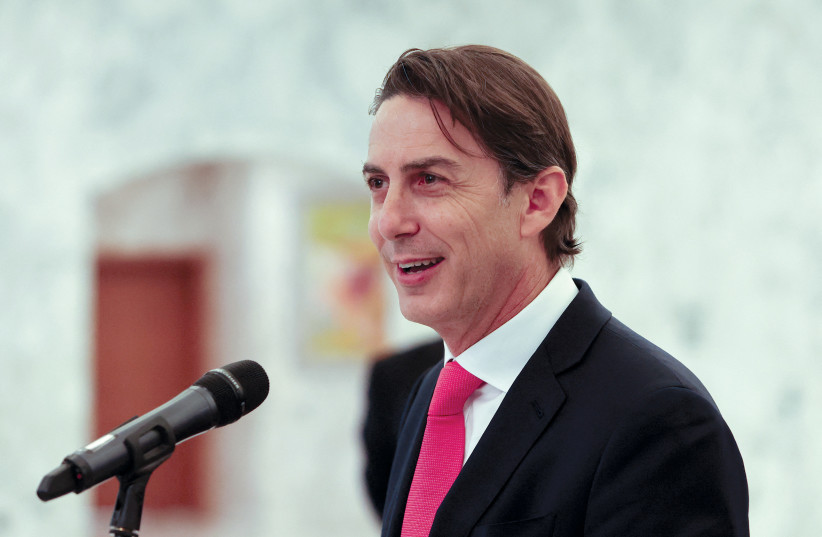Senior US envoy Amos Hochstein visited Lebanon last week for talks with senior officials reportedly aimed at finding ways to resolve the decades-long border dispute between the two countries and reducing tensions along the border.
For more stories from The Media Line go to themedialine.org
Hochstein's visit came as the United Nations Security Council voted to renew the mandate of the UN peacekeeping force on the border, UNIFIL, for a further year.
Asked at the end of his two-day visit whether he had come to mediate between Lebanon and Israel in their long border dispute, Hochstein said that he had listened to the views of the Lebanese government and then visited the border area “to learn more about what is needed in order to be able to achieve an outcome.”
During his visit, he met with caretaker Prime Minister Najib Mikati, Parliament Speaker Nabih Berri, and other officials.
Can Amos Hochstein fix the Israel-Lebanon land border?
Hochstein, who last year brokered a maritime border deal between Lebanon and Israel that paved the way for gas exploration in the area, said that he also plans to hear the Israeli view “and to make an assessment if this is the right time and if we have a window of opportunity to be able to achieve it.” He added that the US “always supports what enables stability and security.”

Sarit Zehavi, founder and president of the Alma Research and Education Center, which focuses on Israel's northern security challenges on its northern borders, told The Media Line that Hochstein's visit was aimed at starting land border negotiations between the two countries and reducing tensions on the border.
According to the Hezbollah-affiliated Lebanese newspaper Al-Akhbar, Hochstein told officials in Lebanon, "Don’t torture me like with the maritime border negotiations.”
Zehavi said that negotiations on the land border would take time and that Hochstein's mission was "to make sure that Hezbollah will not deteriorate the situation even further."
Meanwhile, the UN Security Council vote to extend UNIFIL's mandate came after the Lebanese government requested that UNIFIL be required to coordinate movements with the Lebanese army. The Security Council rejected the request, saying that the mission’s "ability to conduct patrols and activities independently must be maintained.” However, it agreed that cooperation and coordination between UNIFIL and the Lebanese army “remain crucial."
It is widely understood that Iranian proxy Hezbollah was behind the Lebanese request to restrict UNIFIL's mandate. Hezbollah has reportedly been erecting observation towers, conducting military drills, and hampering UNIFIL's movements in the border area.
"Hezbollah wants to make sure that the UNIFIL forces are not able to locate its fighters and bases, and to avoid tensions with the local populace."
Abdulsalam Sinno
"Hezbollah wants to make sure that the UNIFIL forces are not able to locate its fighters and bases, and to avoid tensions with the local populace," Abdulsalam Sinno, a UAE-based political analyst, told The Media Line.
Sinno said Israel had rejected Lebanon's stance on restricting UNIFIL's movements.
In context: UNIFIL, the United Nations Interim Force in Lebanon, was established by the UN Security Council in 1978 to confirm Israel's withdrawal from southern Lebanon. Its mandate is renewed yearly, and has been adjusted several times over the years to include: monitoring the cessation of hostilities; accompanying and supporting the Lebanese Armed Forces deployed in southern Lebanon; and helping to ensure humanitarian access to civilians and the safe return of displaced people. It comprises 10,000 peacekeepers from 46 nations.
Mona Alami, a Lebanese consultant and senior analyst, told The Media Line that the international presence does help contain smaller escalations at the border.
She said that aggressions over the border in recent years often occurred without Hezbollah's direct endorsement, instead being attributed to Palestinian factions.
"But nothing can happen in the south without Hezbollah's knowledge," Alami said.
However, she said that she did not believe that a major conflict between Hezbollah and Israel was imminent. She said that Hezbollah did not have the necessary regional backup to enter a major conflict with Israel, and that various Hezbollah strongholds had been bombed with Russian approval.
"I think the Russians are very firm on not allowing conflict with Israel," she said.
Alami also said that Hezbollah did not want any extensive conflict with Israel because it might lose public support and suffer irreparable damage.
"Hezbollah is the stronger party in Lebanon, thanks to its arms. The government and the politicians who still rule Lebanon have lost all legitimacy socially," she said.
In addition, Hezbollah will not begin any major conflict with Israel in southern Lebanon without Iranian approval.
However, Zehavi said that tensions on the border are the highest they have been in many years.
"We are closer than ever [to a major conflict] compared to the past 17 years," she said. "The border situation is exactly like before the 2006 war. Too many bad signs."
